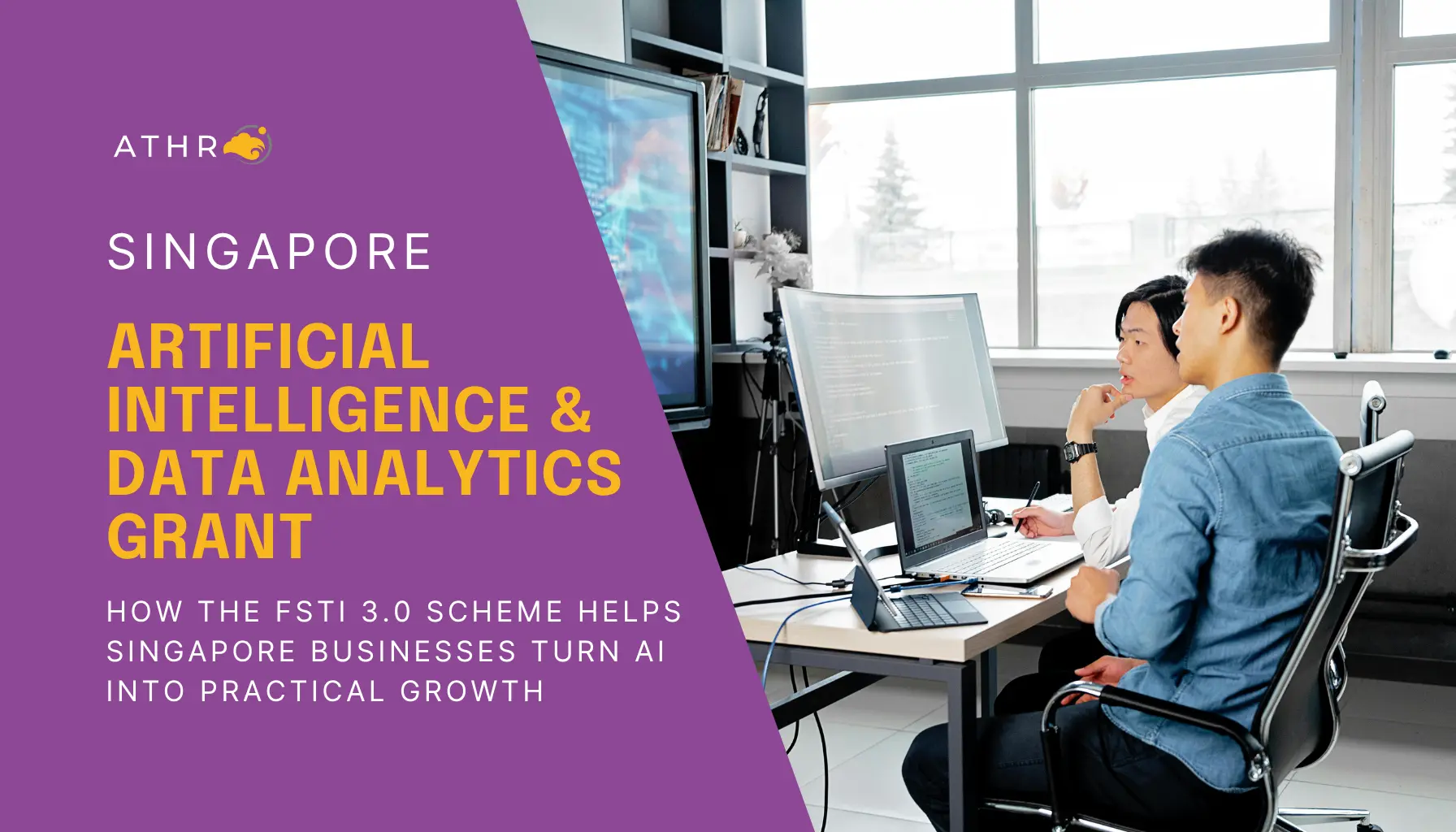


Artificial Intelligence is no longer futuristic — it’s practical, measurable, and fundable. Through the Artificial Intelligence and Data Analytics (AIDA) Grant under the Monetary Authority of Singapore's (MAS) Financial Sector Technology and Innovation (FSTI 3.0) scheme, SMEs can co-fund AI projects that enhance decision-making, automate operations, and reskill employees. This guide explores how AIDA makes AI adoption accessible, from funding details to real-world use cases shaping Singapore’s next phase of business innovation.
Singapore remains a leading hub for offshoring, but the next wave of growth is intelligence-driven. From my perspective, Artificial Intelligence is now a practical force reshaping how SMEs compete and make decisions. With initiatives like the AIDA Grant and FSTI 3.0, Singapore is turning AI from concept into capability for every business.
I see the same dilemma repeated in boardrooms of SMEs: leaders know AI is critical, but they don’t know where to start or how to fund it.
The AIDA Grant Singapore bridges that gap. It does not demand a billion-dollar lab or a PhD data-science team. Instead, it supports projects that apply AI to real business problems, fraud detection, customer segmentation, document automation, predictive analytics for sales or logistics, and more.
This practicality is essential. Many SMEs still see “AI” as an abstract technology that belongs to Silicon Valley. Yet the most successful Singaporean AI startups, such as Hypotenuse AI in content generation or Carousell in marketplace optimization, prove that practical AI thrives in our regulatory and business environment when supported by structured funding.
The AIDA Grant sits under the Financial Sector Technology and Innovation (FSTI) scheme by MAS. Its objective: to encourage AI adoption and data-driven transformation in financial institutions and adjacent industries.
It has two tracks:
Under FSTI 3.0, MAS committed an additional S$100 million to expand the scheme into quantum computing and AI-security capabilities, bringing total innovation funding above S$250 million.
In practice, this means SMEs that align their digital strategies with the data analytics grant priorities, such as responsible AI, privacy-preserving data use, and fraud detection, can now collaborate with banks or fintech players on pilot projects supported by government co-funding.
Singapore’s Regulatory Edge in AI Adoption
Singapore’s regulatory philosophy is pro-innovation, pro-governance. IMDA’s AI Sandbox and AI Trailblazers Initiative with Google Cloud give startups and SMEs controlled environments to test generative-AI tools before full deployment.
For founders, this reduces compliance risk while accelerating product-to-market cycles. Instead of fearing regulation, businesses can co-design use-cases with regulators, a rare privilege globally.
Dr Andrew Ng of AI Fund put it succinctly at TechCrunch Disrupt: “Singapore’s regulatory landscape is robust yet accommodating, a fertile ground for innovation.”
From my vantage point advising hundreds of Singapore-registered entities, this balance between structure and flexibility is exactly what entrepreneurs need. It allows AI to evolve responsibly without stifling experimentation.
Finance
Banks are already leveraging the AIDA Grant to build predictive risk-assessment tools, automated compliance systems, and real-time fraud-detection engines. MAS itself is piloting an industry-wide AI collaboration to pool anonymised inter-bank data for early scam detection, a model every SME handling transactions should watch closely.
Healthcare
Health-tech agency Synapxe’s AI-assisted readmission-risk system exemplifies the power of integrating structured public data with machine-learning algorithms. For AI startups in health or insurance sectors, Singapore’s open data architecture and compliance clarity make innovation viable without breaching patient privacy.
Professional Services and Retail
From automated invoice reconciliation to sentiment analysis in marketing campaigns, SMEs are applying AI to eliminate manual work. At ATHR, we’ve seen accounting clients reduce month-end close times by 40 per cent after adopting AI-driven document classification.
As someone who regularly guides clients through grant applications, my strongest recommendation is to treat grants not as subsidies, but as strategic accelerators.
Here’s how an SME should approach the AIDA Grant Singapore:
1. Diagnose before investing.
Identify one or two pain points that create measurable cost or delay, such as manual onboarding, invoice matching, or compliance reporting. MAS prefers projects with quantifiable outcomes: reduced turnaround time, higher accuracy, or improved decision quality.
2. Build a collaborative proposal.
SMEs rarely qualify alone under the Financial Institution Track, but partnerships change the equation. Collaborate with fintechs or industry associations to show ecosystem impact. This positions the project as scalable rather than isolated.
3. Integrate workforce transformation.
A unique feature of the data analytics grant is the mandatory reskilling plan. SMEs should include staff training (e.g., AI-literacy workshops, Python or Power BI analytics courses) to satisfy this requirement and future proof their teams.
4. Budget with co-funding discipline.
MAS reimburses based on milestones. Maintain clear financial records and ensure your vendors are Singapore-registered for proper audit trails. Experienced corporate-service partners can help align the accounting with grant conditions.
5. Prepare for compliance and post-implementation review.
MAS and IMDA may evaluate project outcomes. Keeping proper documentation: KPIs, data-governance frameworks, model-testing results,...is essential for continued funding and credibility.
No algorithm succeeds without adoption by humans. The MAS design of the AIDA Grant wisely intertwines technology and workforce development.
At ATHR, we encourage SMEs to form AI Champion Teams, cross-functional groups combining management, IT, and operations. Their mission is to identify high-impact use-cases, coordinate training, and ensure measurable ROI.
This approach turns AI from an external project into an internal capability. Over time, employees who once resisted automation become data-literate decision-makers. That shift is far more valuable than any single grant amount.
The Bottom Line
The AIDA Grant Singapore represents more than just funding support. It offers a clear path for SMEs to build long-term digital strength by combining technology, data, and people.
Singapore has already laid the foundation for this shift with strong infrastructure, supportive regulation, and an ecosystem that connects innovators, financiers, and policymakers. AI and data analytics are no longer distant ideas, they are everyday tools that can sharpen competitiveness and open regional opportunities for growth.
From my experience advising business leaders, success comes when companies use grants like AIDA not only to adopt new systems but to create a culture of learning, experimentation, and responsible data use. Those that move early will define the next generation of Singapore’s digital economy and set the pace for AI innovation across Asia.
